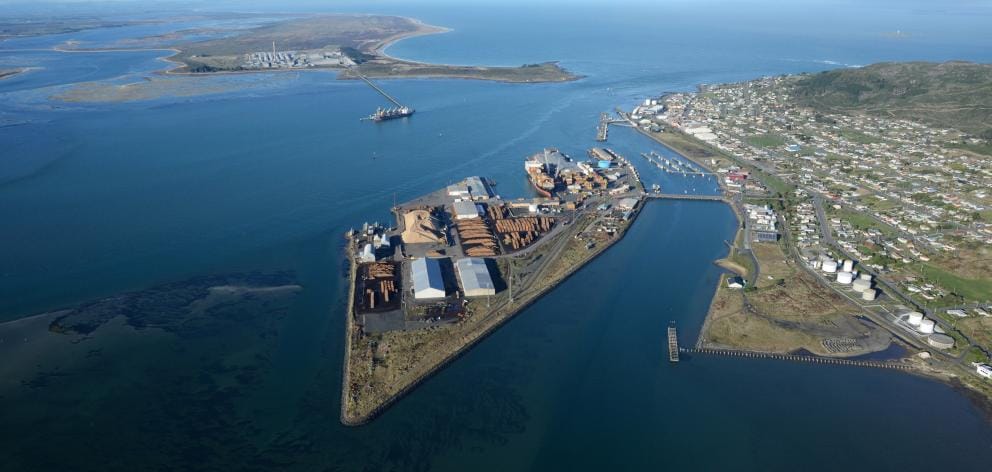Strong cargo flows and robust demand from Southland’s import-export community in the June year has enabled South Port New Zealand Limited to repeat a record volume of 3.05 million tonnes handled.
“Breaking the 3.0 million tonnes threshold was a significant milestone for South Port and comes on the back of consistent growth achieved over several years,” said the Chairman, Mr Rex Chapman.
He added that “during the majority of the 2000-10 decade cargo remained around 2.0 to 2.1 million tonnes, but since then the Port’s freight volumes have climbed steadily.”
Net profit after tax at $8.45 million is noticeably higher than the initial guidance at the time of the FY16 result when South Port signalled the commencement of a programme of increased maintenance expenditure on fixed infrastructure.
The profit outcome is modestly lower than the comparative FY16 result of $8.71 million and has been achieved after an 18% increase in repairs and maintenance costs.
”A new container throughput record of 39,300 TEU (up from 35,100 last year) was achieved in FY17,” said the Chairman, Mr Rex Chapman.
“This lift was created by increased cargo flows by the dairy processing sector, inbound cement, fertiliser and farm nutrition products.”
Revenue from port and warehousing operations is $36.9 million (FY16 $36.7 million).
Operating profit before financing costs and tax decreased by 3% to $12.3 million
($12.7 million).
Earnings per share, based on reported profit, are 32.2 cents (33.2 cents).
South Port sustains a strong balance sheet, with total equity at $37.2 million ($35.6 million) after dividend payments of $6.82 million ($6.43 million). Group assets are level at $53 million. Net tangible asset backing per share is $1.42 ($1.36).
Current assets rise to $6.0 million ($5.6 million) while current liabilities drop to $5.0 million ($12.6 million), with a positive effect on net working capital at $1.0 million (-$7 million).
Term liabilities stand at $10.4 million ($4.8 million).
The Board has elected to pay a consistent final dividend of 18.5 cents per share,
which results in a steady total dividend for the full year of 26.0 cents.
Mr Chapman says this represents a gross return of 6.1% (net 4.4%) based on a
share price of $5.93 as at 30 June 2017. The dividend payout ratio is 81% of NPAT,
which is 65% of free cash flow.
He said, “a significant contributor to the financial strength and commercial success of
the Company has been Chief Executive, Mr Mark O’Connor, who is stepping aside
on 1 October after 24 years with South Port, 18 as Chief Executive.”
Commenting on operations, Mr O’Connor said, “bulk cargo activity remains the back
bone of the business and the key product flows of forestry, NZAS-related materials,
fertiliser, petroleum and other agri-products continue to demonstrate either growth or
stability.”
“Exports of forestry products [logs/woodchips/sawn timber] have climbed and now
represent almost 30% of the business throughput. Logs are now a significant part of
this and are at an annual high of 560,000 tonnes.”
“This cargo flow was made possible by a range of important export customers, the
largest of which is Rayonier/Matariki Forests.”
“The New Zealand Aluminium Smelter displays a high level of resilience despite
facing several external challenges.”
He noted the dairy sector is still in a rebuilding phase. Stock food import levels into
Bluff Port fell by 30,000 tonnes, or 20% year-on-year, in FY17.
A higher level of R&M expenditure over the next several years is required with a
number of significant infrastructural assets at or near the end of their physical useful
life.
Capital projects during the coming 12 months include construction of replacement
access for the Town Wharf fuel import berth, at an estimated cost of $5.0 million.
This structure services the inbound petroleum products for both Southland and the
Wakatipu Basin. Secondly, to assist the growth of log exports, a 1.0 ha. log storage
area will be paved and adjoining drainage systems upgraded (estimated cost
$2.2 million).
Mr O’Connor noted one of the business development prospects included the new
Mataura Valley Milk infant formula plant under construction and expected to be
operating at capacity by Spring 2018. South Port’s Board and Management have
supported the Southland Regional Development Strategy aimed at strengthening the
southern New Zealand economy.
Mr Chapman said, “main cargo flows are expected to show modest upside in FY18,
while the improving profitability of the dairy sector should assist the region. FY18
earnings are likely to remain stable and in that context South Port Directors would
look to maintain the current level of dividend payment.”
Despite greater volatility of international political events, the New Zealand economy
and key export markets remained resilient. “A long-run positive economic cycle has
provided South Port with a relatively stable platform to service its cargo base and
support recent growth-capital expenditure.”

